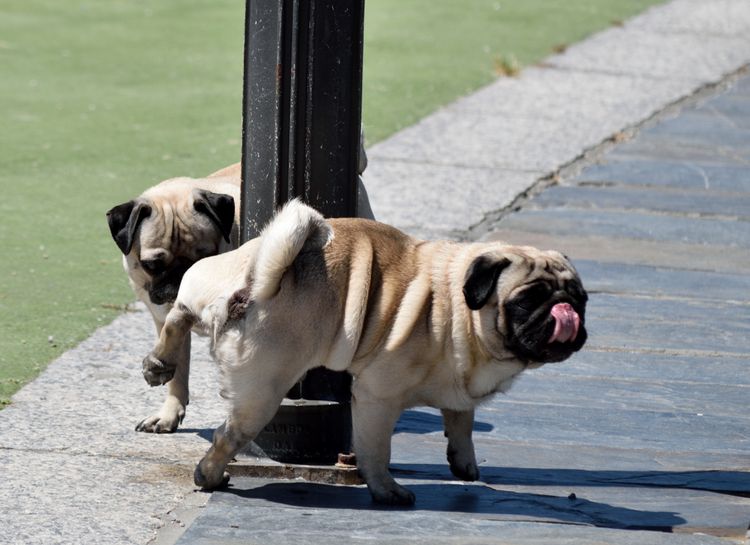Why Do Dogs Lick Other Dogs' Pee?

Have you ever noticed your dog licking another dog's pee? Dogs are known to display plenty of odd behaviors and weird habits, like sniffing each other's rears or suddenly getting the zoomies. When dogs sniff the urine of other dogs, they get a world of stimulating information.
Despite how off-putting we humans see it, dogs seem to enjoy it. Fortunately, this behavior is generally harmless—unless the other dog is sick.
Why Does My Dog Lick Other Dogs' Pee?
Dogs use their noses to explore the world around them. An advanced olfactory system allows dogs to smell much better than humans. They actually have a structure in their nasal passages called the vomeronasal organ or Jacobson's organ that enables them to smell pheromones. They can take in complex layers of scents and will sometimes lick objects, surfaces, and even other dogs in order to get a better whiff.
Urine contains chemicals and pheromones that are unique to each dog. It tells a story about the dog and can provide clues about the dog's sex, reproductive status, health, and diet. This explains the reason for urine marking: Dogs urinate on objects to mark their territories and communicate with other dogs. Of course, this is why your dog is drawn to the pee of other dogs.
You may see your dog licking in addition to smelling the urine so he can fully take in all of the "aromas" from the other dog. Some dogs will rub their faces and bodies on desirable scents, and this may include the urine of another dog.
Is Licking Other Dogs' Pee a Problem?
You may find it unsettling to see your dog licking another dog's urine. Relax, there is nothing wrong with your dog. This instinctive behavior is normal and usually harmless. However, a dog can contract an infectious disease from licking the urine of animals.
Leptospirosis is a bacterial disease that is contagious to both humans and dogs. It is often transmitted through the urine of wildlife like rodents. Dogs with leptospirosis can spread this disease through their urine as well, infecting humans, dogs, or other animals. Leptospirosis causes flu-like symptoms and can lead to liver failure or kidney failure in dogs and people. Dogs are more likely to contract leptospirosis from contaminated water, but it is technically possible to get the disease directly from another dog. Therefore, it can be a concern if your dog is licking the urine of unknown dogs. Contact your veterinarian if you suspect your dog has been exposed to leptospirosis or is showing signs of illness.
Intestinal parasites and gastrointestinal viruses like parvo are not passed via urine. However, a dog could contract a disease after licking the genital area of an infected dog if the dog is shedding the parasite or virus from the anus.
A rare bladder parasite called Capillaria plica can affect dogs, but not directly from another dog's urine. Instead, the infected dog urinates the parasite's eggs, which then develop into larvae and enter earthworms. A dog must eat the infected earthworm to contract the parasite.
How to Stop Dogs From Licking Other Dogs' Pee
There may be times when you want to stop your dog from licking other dogs' urine. Many owners are disgusted by the sight of it even though it's normal behavior. More likely, you are concerned that your dog may contract an infectious disease.
Training can help you prevent your dog from licking other dogs' pee. Practice cues like drop it and leave it so you can interrupt your dog the moment you catch him trying to eat something bad. If your dog fails to obey, use positive reinforcement rather than punishment. Redirect your dog to a toy or game. Reward him for diverting his attention from the undesired item.
Your dog is most likely to lick another dog's pee during a walk or while playing in a dog park. Watch your dog closely at these times. If your dog is on a leash, simply lead him away from other dogs that are peeing. You will need to watch your dog closely at the dog park or while playing outdoors with other dogs. Only allow your dog to play with healthy dogs.
You may need to take a break from the dog park if you cannot stop your dog from licking other dog's pee. Work on training in a controlled environment, like your yard. Invite familiar, healthy dogs over from doggie "playdates" so you can supervise and work on the "leave it" cue.